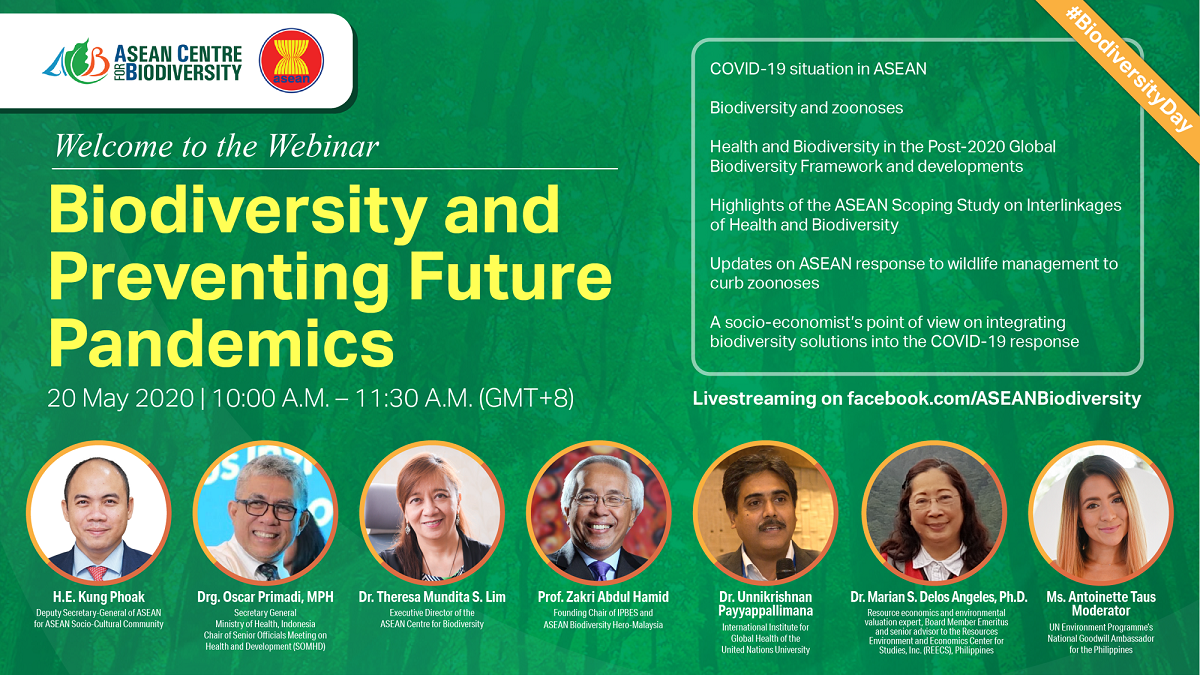
JAKARTA, 20 May 2020 The ASEAN Secretariat (ASEC) and the ASEAN Centre for Biodiversity (ACB) held their first webinar on May 20, underscoring the linkages of biodiversity and health and regional efforts to integrate biodiversity conservation into the COVID-19 response.
Gathering a panel of experts, the webinar entitled Biodiversity and Preventing Future Pandemics took place through Zoom and was broadcast live on Facebook, engaging citizens and various audiences from the ASEAN Member States about nature s role in preventing future pandemics.
Deputy Secretary-General (DSG) of ASEAN for Socio-Cultural Community Kung Phoak opened the webinar. In his remarks, he said, In spite of restrictions on movements in most of the ASEAN region, ASEAN Secretariat and the ACB are keen to use this momentum to engage ASEAN sectoral bodies and the general public to exchange knowledge, ideas, and experiences on interlinkages of biodiversity and human health.
DSG Kung underscored the importance of nature-based solutions to prevent future pandemics through cross-sectoral collaboration and multi-stakeholder engagement, as part of ASEAN s agenda on mainstreaming biodiversity across relevant sectors, while encouraging individuals and community to become bio-literate to adopt behaviours that address the root-cause of future pandemic and zoonosis
The panel included ACB Executive Director Theresa Mundita Lim; Acep Somantri, Director of the Bureau of International Cooperation of Indonesia s Ministry of Health; Founding chair of the Intergovernmental Science-Policy Platform on Biodiversity and Ecosystem Services (IPBES) Dr. Tan Sri Zakri bin Abdul Hamid; Dr. Unnikrishnan Payyappallimana of the International Institute for Global Health of the United Nations University; and Dr. Marian Delos Angeles, resource economics and environmental valuation expert. Antoinette Taus, UN Environment Programme s National Goodwill Ambassador for the Philippines, moderated the two-hour session.
Dr. Lim, a wildlife management expert, stressed the need for greater cooperation within ASEAN and with other regional bodies and governments of the world to prevent future pandemics as COVID-19 may not be the last. She cited recent IPBES data that there may be around 1.7 million unidentified viruses believed to still exist in mammals and water birds that can infect people.
The decline of species can trigger the spillover of viruses that are dormant or inactive, leading to their transmission to both domestic animals and humans. This grim data should serve as a warning to all of us, Dr. Lim said.
Dr Payyappallimana shared the highlights of the scoping study on the interlinkages of health and biodiversity of the ACB, in cooperation with UNU-IIGH, Kuala Lumpur, and supported by ASEAN-EU Biodiversity Conservation and Management of Protected Areas in ASEAN.
Meanwhile, Dr. Zakri said nature must not be forgotten while governments are saving human lives and rebooting the economy in their post-COVID 19 response. After all, the root cause of those zoonotic diseases such as COVID-19 is the destruction of wildlife habitats, a fact endorsed by most scientific community, Dr. Zakri said.
The activity was part of the efforts of ASEC and ACB to increase their communication activities and mainstream biodiversity across various sectors and disciplines leading up to the International Day for Biological Diversity (IDBD) on May 22. With the theme Our solutions are in nature, the observance of the IDBD highlights the global call to citizens to re-examine their relationship with nature.






